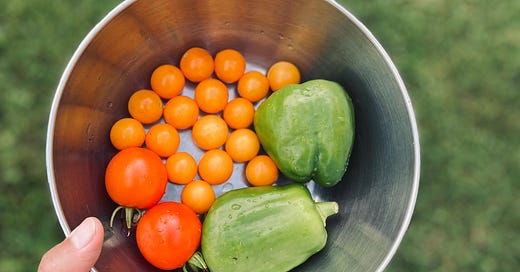We’re exiting the time of year when garden and farm abundance is at its peak. I know this because the wind is flowing through crisp-turning leaves outside my window, and I feel the change on my skin. It’s September, and the Sun is completing its work of saturating fruiting bodies. Summer crops, plump with color, have reached full ripeness and are ready for the last harvest. This season, Virgo season, radiates a particular kind of heat. Temperatures climax before the declining light stretches thinner across the horizon. The New Moon in the mutable Earth sign of Virgo kicked off the month, signaling the growing darkness. Now, indeed, everywhere there are flocks of birds that trace arrow tips pointing southward through the sky. I enter my garden, a little more discerning each time, and reflect on what to gather.
It makes sense to tread more carefully—to look more carefully—during the late summer. On one hand, the weather naturally encourages a slower, more contemplative pace. There are things that we need to be able to catch: the tiny, overripened tomato heavy on the vine; the low-hanging bean almost missed. In Chinese medicine, the last months of summer are associated with the Earth Phase and the planet Saturn. In The Web That Has No Weaver, author Ted Kaptchuk writes, “The theory of Phases is a system of correspondences and patterns that subsume events and things, especially in relationship to their dynamics. Specifically, each Phase is an emblem that denotes a category of related functions and qualities.” Chinese philosophy also associates the Earth Phase with the transition from season to season. As a pattern and a physical place, it is concerned with matters related to what exists in between. The Earth contains the transformation of all the elements.
The astrological system I am most familiar with—the one I am currently studying—has its roots in Greece, Rome, Egypt, and the lands historically known as Mesopotamia (which includes Iraq, Iran, Turkey, Syria, and Kuwait). There isn’t a one-to-one theoretical correspondence in comparing Chinese astrology and Western or Hellenistic astrology. If there were, it might be easier to deduce certain correlations. But it’s not always necessary, or helpful, to make clear-cut comparisons. I imagine it’s more important to remember that each system exists within specific cultural and ecological realities, and can hold multiple possibilities at once. In this vein, the planet Saturn, for example, can be sovereign unto itself, and represent characteristics of the Earth.
Within the Hellenistic tradition, Saturn illustrates the principles of structure and time. Governing soil and agriculture, the gas giant is associated with those who work with the land, such as farmers. I find this specific parallel—in relationship to the Earth—with Chinese astrology endlessly fascinating. Saturn is the last planet in our solar system that we can see without a telescope, and it embodies the classic words of Lao Tzu that ask, “Do you have the patience to wait / Till your mud settles and the water is clear?” One might look to Saturn when trying to do something that takes a long time to build or develop, and it points out (with great finesse!) what we’re made of. Saturn won’t hold back what needs to be seen, touched, and worked with.
In the West, astrology is part of the cultural zeitgeist and has moved in and out of popularity since at least the 1900’s. It’s now easy to find information on the topic and, generally, most of us know the meaning of certain terms and phrases. Back in the analog days, I remember getting the Sunday paper, and quickly thumbing through the long, thin sheets to find the weekly horoscopes. It was a ritual that I looked forward to because it helped set the tone for the upcoming week. In a few words, the astrologer could cut through the fog of my then-adolescent mind with insight. Reading my horoscope every week became a ceremony that stoked my young (Leo-rising) fire. Even now, as I practice giving readings, I am in awe of how accurate and literal astrology can be. It gets at a fundamental need we all have to be seen, to see ourselves more clearly.
I say a phrase to myself whenever I start to feel restless: A small fire generates Qi. I’ve heard iterations of this idea from professors, and first read it in The Yellow Emperor’s Classic of Medicine. It reminds me to re-read a quote I jotted down in a notebook in 2017 by First Nations arts journalist Jesse Wente who said, “Start a fire that keeps you burning for the long run, that doesn’t burst you into flames.” This is good medicine for me, maybe for all of us.
Fire generates creativity and action. It motivates the regeneration of biodiversity through careful, ritual burning. But Fire in excess becomes inflamed, drying up the Earth’s resources, and inevitably leads to deficiency. Large swaths of land burn daily in wildfires sparked by conditions that cause the environment to deteriorate and dry out. The fire that sweeps across the scorched body of the Earth is alive, and it’s the same one that courses through our bodies. How easily we forget.
News
I recently merged my business email list with the Wholly Earth list. This brings a sense of relief after two years of trying to keep up with both. Over the next few months, I’ll continue making adjustments as I learn what works.
Reading
In the spirit of Virgo season, and the bounty of late summer crops, I am making (and eating!) my way through a list of poems curated by the Poetry Foundation on Poetry and Food.
Watching
It’s been a few years since I first watched the 2000 documentary, Half Past Autumn, on the life and work of the legendary photographer Gordon Parks but I think this will be the season to re-watch it.





